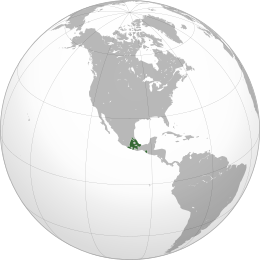Triple Alliance (1428–1521): Difference between revisions
More languages
More actions
(Created) Tag: Visual edit |
General-KJ (talk | contribs) m (Added categories) Tag: Visual edit |
||
| Line 1: | Line 1: | ||
{{Infobox country|name=Triple Alliance|native_name=Ēxcān Tlahtōlōyān|image_coat=Glyphs for Aztec Triple Alliance.svg|capital=Tenōchtitlan|year_start=1428|year_end=1521|coa_size=125|symbol_type=Glyphs of member states|image_map=Aztec Empire map.svg|map_width=260|common_languages=Nahuatl|area_km2=220,000|population_estimate=5–6 million}} | {{Infobox country|name=Triple Alliance|native_name=Ēxcān Tlahtōlōyān|image_coat=Glyphs for Aztec Triple Alliance.svg|capital=Tenōchtitlan|year_start=1428|year_end=1521|coa_size=125|symbol_type=Glyphs of member states|image_map=Aztec Empire map.svg|map_width=260|common_languages=Nahuatl|area_km2=220,000|population_estimate=5–6 million}} | ||
The '''Triple Alliance''', also known as the '''Aztec Empire''', was a Mesoamerican confederation of three city-states: Tenochtitlan, Texcoco, and Tlacopan. | The '''Triple Alliance''', also known as the '''Aztec Empire''', was a [[Mesoamerican]] confederation of three city-states: Tenochtitlan, Texcoco, and Tlacopan. | ||
== History == | == History == | ||
| Line 21: | Line 21: | ||
== References == | == References == | ||
<references /> | |||
[[Category:Aztec]] | |||
[[Category:History of Mexico]] | |||
[[Category:Mesoamerica]] | |||
Latest revision as of 15:42, 4 November 2024
| Triple Alliance Ēxcān Tlahtōlōyān | |
|---|---|
| 1428–1521 | |
 | |
| Capital | Tenōchtitlan |
| Common languages | Nahuatl |
| History | |
• Established | 1428 |
• Dissolution | 1521 |
| Area | |
• Total | 220,000 km² |
| Population | |
• Estimate | 5–6 million |
The Triple Alliance, also known as the Aztec Empire, was a Mesoamerican confederation of three city-states: Tenochtitlan, Texcoco, and Tlacopan.
History[edit | edit source]
Background[edit | edit source]
The Aztecs originated in what is now Utah and migrated south to the valley of Mexico in the 12th century. They helped organize the overthrow of the Toltec civilization. Around 1325, the Aztecs built the city of Tenochtitlan on an island in Lake Texcoco, which the Tepanecs later conquered.[1]
Foundation[edit | edit source]
In 1426, the Aztecs of Tenochtitlan formed an alliance with the Texcoco and Tlacopan peoples and overthrew the Tepanecs. They waged war against neighboring nations until they controlled most of the Valley of Mexico. Tenochtitlan emerged as the dominant city-state and made its subjects pay tribute.[1]
Spanish invasion[edit | edit source]
In the early 16th century, peasant rebellions against tributes weakened the Triple Alliance. Moctezuma Xocoyotzin came to power in 1503 and attempted to reform the empire, but the Spanish overthrew him and destroyed Aztec society in a genocidal three-year war. Indigenous opponents of the Aztecs allied with conquistador Hernan Cortés, but the Spanish colonizers later turned on them too.[1]
Economy[edit | edit source]
The Aztec economy was based on irrigated agriculture. The main crop was corn, but they also farmed beans, pumpkins, tomatoes, tobacco, and cocoa. They also grew cotton to make cloths and clothing. They built large dams, canals, and fortresses out of stone. Aztec cities had complex internal markets.[1]
Trade[edit | edit source]
Aztec merchants bought turquoise from Pueblo people in what is now the southwestern United States and sold it in central Mexico. They also used turquoise as currency to buy other goods.[1]
References[edit | edit source]
- ↑ 1.0 1.1 1.2 1.3 1.4 Roxanne Dunbar-Ortiz (2014). An Indigenous Peoples' History of the United States: 'Follow the Corn' (pp. 19–21). [PDF] Boston, Massachusetts: Beacon Press. ISBN 9780807000403

